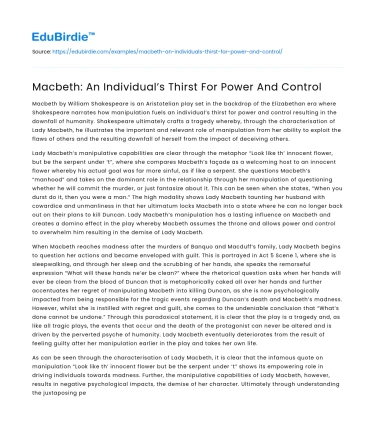Macbeth by William Shakespeare is an Aristotelian play set in the backdrop of the Elizabethan era where Shakespeare narrates how manipulation fuels an individual’s thirst for power and control resulting in the downfall of humanity. Shakespeare ultimately crafts a tragedy whereby, through the characterisation of Lady Macbeth, he illustrates the important and relevant role of manipulation from her ability to exploit the flaws of others and the resulting downfall of herself from the impact of deceiving others.
Lady Macbeth’s manipulative capabilities are clear through the metaphor “Look like th’ innocent flower, but be the serpent under ‘t”, where she compares Macbeth’s façade as a welcoming host to an innocent flower whereby his actual goal was far more sinful, as if like a serpent. She questions Macbeth’s “manhood” and takes on the dominant role in the relationship through her manipulation of questioning whether he will commit the murder, or just fantasize about it. This can be seen when she states, “When you durst do it, then you were a man.” The high modality shows Lady Macbeth taunting her husband with cowardice and unmanliness in that her ultimatum locks Macbeth into a state where he can no longer back out on their plans to kill Duncan. Lady Macbeth’s manipulation has a lasting influence on Macbeth and creates a domino effect in the play whereby Macbeth assumes the throne and allows power and control to overwhelm him resulting in the demise of Lady Macbeth.
Save your time!
We can take care of your essay
- Proper editing and formatting
- Free revision, title page, and bibliography
- Flexible prices and money-back guarantee
When Macbeth reaches madness after the murders of Banquo and Macduff’s family, Lady Macbeth begins to question her actions and became enveloped with guilt. This is portrayed in Act 5 Scene 1, where she is sleepwalking, and through her sleep and the scrubbing of her hands, she speaks the remorseful expression “What will these hands ne’er be clean?” where the rhetorical question asks when her hands will ever be clean from the blood of Duncan that is metaphorically caked all over her hands and further accentuates her regret of manipulating Macbeth into killing Duncan, as she is now psychologically impacted from being responsible for the tragic events regarding Duncan’s death and Macbeth’s madness. However, whilst she is instilled with regret and guilt, she comes to the undeniable conclusion that “What’s done cannot be undone.” Through this paradoxical statement, it is clear that the play is a tragedy and, as like all tragic plays, the events that occur and the death of the protagonist can never be altered and is driven by the perverted psyche of humanity. Lady Macbeth eventually deteriorates from the result of feeling guilty after her manipulation earlier in the play and takes her own life.
As can be seen through the characterisation of Lady Macbeth, it is clear that the infamous quote on manipulation “Look like th’ innocent flower but be the serpent under ‘t” shows its empowering role in driving individuals towards madness. Further, the manipulative capabilities of Lady Macbeth, however, results in negative psychological impacts, the demise of her character. Ultimately through understanding the juxtaposing personas of innocence and corruption, we learn of the complex human condition.
Did you like this example?
Make sure you submit a unique essay
Our writers will provide you with an essay sample written from scratch: any topic, any deadline, any instructions.
Cite this paper
-
APA
-
MLA
-
Harvard
-
Vancouver
Macbeth: An Individual’s Thirst For Power And Control.
(2022, March 17). Edubirdie. Retrieved December 21, 2024, from https://edubirdie.com/examples/macbeth-an-individuals-thirst-for-power-and-control/
“Macbeth: An Individual’s Thirst For Power And Control.” Edubirdie, 17 Mar. 2022, edubirdie.com/examples/macbeth-an-individuals-thirst-for-power-and-control/
Macbeth: An Individual’s Thirst For Power And Control. [online].
Available at: <https://edubirdie.com/examples/macbeth-an-individuals-thirst-for-power-and-control/> [Accessed 21 Dec. 2024].
Macbeth: An Individual’s Thirst For Power And Control [Internet]. Edubirdie.
2022 Mar 17 [cited 2024 Dec 21].
Available from: https://edubirdie.com/examples/macbeth-an-individuals-thirst-for-power-and-control/
copy






 Stuck on your essay?
Stuck on your essay?

